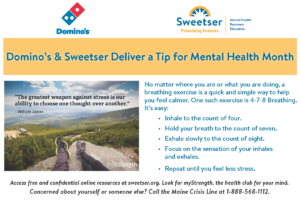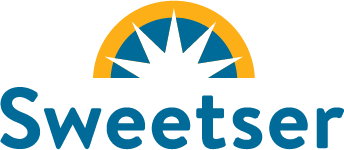This article originally appeared on the Eating Disorders Association of Maine website. It was written by Briana Ciallela, a clinical intern for Sweetser’s New England Eating Disorders (NEED) program. She received her Bachelor of Arts degree in psychology from Bard College and is currently a Master of Social Work candidate at the University of New England.
February 24th through March 1st, 2020 is National Eating Disorders Awareness Week (NEDAW). As a social work intern at the New England Eating Disorders (NEED) program at Sweetser in Saco, Maine, it has been exciting to learn about treatments for eating disorders. Since my time at NEED, I have observed how planning recovery skills is critically important for treatment and have seen firsthand how this can make a difference. In treatment, these skills act as patient coping options and go hand-in-hand with the support that clinicians offer to individuals struggling with these devastating conditions. In honor of NEDAW, here are seven basic eating disorder recovery skills.
1. Ask for help. Encourage patients with eating disorders to take advantage of their support systems and ask for help. For some, asking for help can be difficult to get the hang of, but ultimately it is an important, and often crucial, long-term recovery skill.
2. Expand social environment. Surrounding oneself with positive relationships has been proven effective in the treatment of eating disorders (de Vos et al., 2017). Help a patient to identify current supports and then look beyond these supports to other potential family members, friends, family of choice members, coworkers, etc. to expand the recovery support circle. Having a rich social network is critically useful to finding strength and achieving recovery.
3. Accept valid criticism and reject invalid criticism. Criticism is never easy. When an individual is suffering from an eating disorder, harsh criticism can feel even more devastating. Valid criticism and invalid criticism are quite similar to fact and fiction. Valid criticism (e.g., describing the importance of nutrition for general health and well-being) can provide knowledge to the patient. Invalid criticism, on the other hand, is often hurtful and offers no fact-based information about the importance of nourishing the body and working toward recovery.
4. Reality checking/ mindfulness. When situations are really tough, uncomfortable, or can seem impossible in the moment, encourage patients to take a few moments to ground themselves and focus on the facts. Ask patients to take a moment to put their feet flat on the floor, take a few deep breaths, and focus on their sensory experience. Ask patients to remind themselves of the realities of the moment. If this is difficult to do, ask a patient to consult with a trusted confidante to explain a situation and test the reality of their appraisal of the situation.
5. Assertiveness. Encourage patients to not only be assertive with others, but also with their eating disorders. The individual is in control of their recovery and it is important to let the eating disorder understand that. Additionally, allow patients the privilege of being assertive about their needs when communicating with others throughout the duration of their recovery.
6. Boundary setting. Encourage patients with eating disorders to set distinct boundaries around people and/or situations that feed into their eating disorder. Hurtful words or actions from others have the potential to induce feelings of toxic shame, making individuals feel worse about their bodies and emotional state. Setting appropriate boundaries, particularly during triggering times, and engaging in proactive problem solving to identify these boundaries ahead of time is paramount for relapse prevention.
7. Distress tolerance. Patients with eating disorders are practicing distress tolerance every time they sit down to complete a difficult meal or snack, as they are confronting significant fears. It is important to survive very anxiety-provoking situations during recovery. Once one feared situation is confronted repeatedly, this often generalizes. As therapists, allowing patients to experience this distress and tolerate it is at the foundation of most evidence-based treatments for eating disorders.
References:
De Vos, J.A., LaMarre, A., Radstaak, M. et al. (2017). Identifying fundamental criteria for eating disorder recovery: a systematic review and qualitative meta-analysis. Journal of Eating Disorders 5, 34. https://doi.org/10.1186/s40337-017-0164-0



